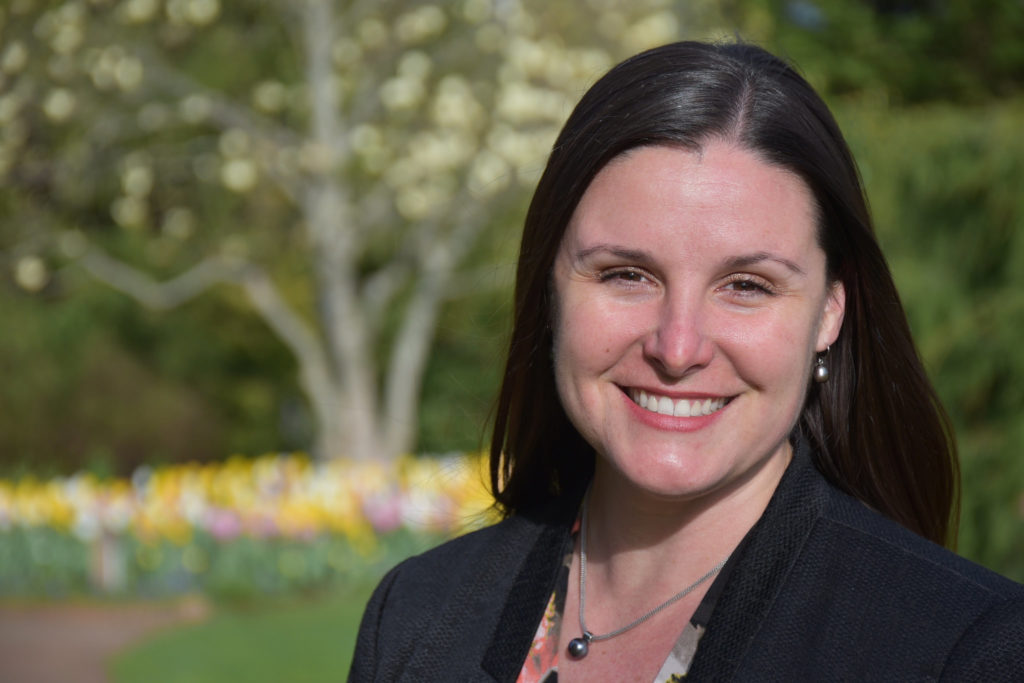New England Botanic Garden at Tower Hill CEO Grace Elton recently sat down with public relations manager Robert Burgess to chat about their favorite topic: gardening.
Robert: What are the different climates you’ve gardened in?
Grace: I grew up gardening in Homestead, Florida, which is Zone 10 [on the USDA Plant Hardiness Map], and Jupiter, Florida, which is zone 9. Both zones are hot and extremely humid. We had amazing fruit trees in our yard. Lots of citrus (oranges, grapefruit, starfruit), orchids, palms, and other tropical plants. We made starfruit pies instead of apple pies and I harvested loads of lychees each year. I got started early identifying plants as well as plant pests from a young age. When I was three years old, I was looking at a milkweed and said “Look daddy, aphids!” It’s not surprising I ended up in this career. I was in Zone 8 while I studied horticulture at the University of Florida, and then I jumped to Zone 6 in Pennsylvania where I worked at Longwood Gardens and then at the Ambler Arboretum of Temple. The climate was a huge shock. I arrived on New Year’s Day and was so excited to see snow on the ground, but I had no idea how to garden there. Luckily, Longwood Gardens is just about the best place to learn.
This will be your first time gardening in a climate like New England’s?
Yes, when you move to a new climate, you are almost in the same boat as someone new to gardening. Even though I have years of experience, I’ll have to reset my thinking and do research. Coming to a new area with different soil, a growing zone, and different plants, I will have fun figuring out what I’m working with. I know I’m going to be watching the Vegetable Garden here to see what does well in this area. Of course, a lot of gardening is trial and error. Being a gardener sometimes your plants won’t make it, but that’s OK because it’s a learning experience.
What is your approach to lawn care?
My philosophy on lawns is if you’re going to use it for picnics, playing soccer, as a space for your dog to run, then that’s fine, have a lawn. But if you’re just going to look at it, it’s not worth the time and resources to keep it watered, fertilized, and mowed, so plant a garden. I like overseeding my lawn with clover. Before the idea of the perfect American lawn came to be, there were all different kinds of seed in grass mixes. Clover is a legume, adding nitrogen to the soil, so it’s like free fertilizer. It’s also a food source for the bees when it blooms.
What advice would you give a visitor who is planning their first vegetable garden?
The first thing they should do is check our course listing, because we have a great resources here at the garden. We might have the perfect program that will fill that gap in their knowledge, or the perfect reference book or article that will help them with a specific problem. Also, they should come and visit the garden, because they will certainly be inspired by what they will find here. Then, after the research is done and you have your inspiration, soil is the key to any garden; I wouldn’t start a new garden without getting a soil test first. If you plant something that inspires you in the wrong soil and it dies, you might get frustrated and maybe not become a lifelong gardener.
What are your favorite edible shrubs or trees?
I really like plants that will give you more bang for your buck. For example, blueberries are one of the first shrubs to bloom in the spring, the flowers support honeybees, then of course you get a tasty edible fruit, and finally beautiful fall foliage. Service berries are great too. They have a tart fruit, but make great jams. They are a small tree that will fit in almost any backyard and have multi-season interest with small white flowers in the spring and great fall color.
How do you get creative at harvest time?
Most vegetable gardeners overplant a crop at some point in their life and end up with way too much than they can use. In Pennsylvania I had a big vegetable plot at a community garden that I founded. I got really into canning jams and jellies. Once we did green pepper jelly and it was surprisingly so good! My grandmother gave me a great cookbook, “Too Many Tomatoes,” with lots of old fashioned recipes, to help when you have an abundant harvest. I also was freezing a lot of what we grew for later. When you end up with too much of one thing from the garden, it makes you think outside the box.

